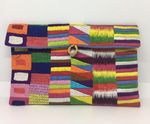Project Stitch Sainte Luce: Phase IV - 3-Month Interim Report
←
→
Page content transcription
If your browser does not render page correctly, please read the page content below
3-Month Interim Report
Project Stitch Sainte Luce: Phase IV
October – December 2017
Prepared for the
The Leopardess Foundation
January 2018
SEED Madagascar
Suite 7, 1a Beethoven St, London, W10 4LG, United Kingdom
Villa Rabemanda, Ambinanikely, B.P. 318, Tolagnaro, Madagascar
Tel: +44 (0)208 960 6629
Email: projects@seedmadagascar.org
Web: madagascar.co.uk
UK Charity No. 1079121, Company No. 3796669
11. Project Summary
Project Stitch Sainte Luce (hereafter Stitch) aims to increase women’s incomes, social standing and
economic resilience through developing embroidery as a sustainable livelihood opportunity in Sainte Luce.
Sainte Luce is a rural fishing village where women have few livelihood opportunities, due to cultural
traditions, lack of education and the isolated location of the village. Most women are reliant on the
marginal fishing income of a husband or father. Stitch seeks to empower women by enabling them to
generate their own income though embroidery, allowing them to invest in their children’s futures and help
lift the community out of chronic poverty.
Since 2012, Stitch has trained 21 women in embroidery, who now run the officially registered Stitch
Embroidery Cooperative that produces high quality, embroidered products for the tourist market. The
purpose of Phase IV is to expand, strengthen and increase the independence of this Cooperative,
positioning it to continue without external donor support by project end. Overcoming donor reliance is
essential for the sustainability of the Stitch enterprise, thus resulting in true empowerment for the
embroiderers who will have full autonomy over and responsibility for their business. Phase IV also aims to
increase the number of families profiting from the socio-economic benefits of Stitch, whilst ensuring the
business is continually run in a fair and effective manner that meets the best interests of all its
embroiderers.
Women of the Stitch Cooperative hard at work in the studio
2. Activity Detail
Outcome 1: Expanding the Cooperative
The main focus in these opening months of Phase IV has centred on the preparations for expanding the
Cooperative to over 80 members, by providing current informal associate embroiderers with an
opportunity to join the Stitch Embroidery Cooperatives as official members. A series of meetings were
conducted between project staff, the Stitch Cooperative and the associates to negotiate and establish the
terms of the expansion. During these discussions, details such as age limits, equipment provision, entry fees
and representation for new members were considered by the three parties, alongside defining new roles,
responsibilities and training commitments for current embroiderers. Despite differences of opinion
between the parties in several areas, an agreement was eventually found on all points and the terms for
expanding the Cooperative have been accepted by both current and prospective members. Throughout
2these meetings, local project staff were effective in ensuring discussions were open and receptive to the
viewpoints of all women, whilst also being productive and leading towards a compromise.
All embroiderers and prospective new members have now agreed to the Terms of Expansion, with the
official registration and welcome event provisionally set for the 26th January 2018. Aware that December
can be an expensive month, several forward-thinking associates had already paid a contribution of their
20,000 Ariary1 joining fee to the Cooperative before Christmas, demonstrating their commitment to
becoming members of Stitch.
Meetings with the Stitch Cooperative to discuss and work through the terms of the expansion
Outcome 2: Strengthening the Cooperative through Skills Training
English teaching
Bespoke English language teaching within the Cooperative as part of Stitch has been ongoing throughout
2017, in collaboration with and guided by SEED’s English department. Teaching has been conducted by our
local Project Assistant, Paula, who is based in the studio in Sainte Luce for a majority of the time and thus
has been able to deliver regular and consistent lessons to the embroiderers. Lesson plans specific to
Project Stitch have been provided by the English department, along with bi-annual assessments of
students’ abilities conducted by SEED’s English Coordinator. Moreover, the English department continue to
provide regular teacher training and support to Paula, with an international English teaching volunteer
delivering an additional teaching session for the embroiderers once per month.
At the start of Phase IV in October, voluntary re-assessments were done with the embroiderers to assess
ability, improvement and motivation to learn. Using these assessments, alongside the Project Assistants’
knowledge of the group and in consultation with the embroiderers, five students – Guerceline, Rosline,
Pelagine, Esterline and Olga – were selected to be the focus of English teaching going forwards and receive
more intensive lessons. Thrice weekly lessons with these embroiderers have now begun, supported by
additional one-on-one practice sessions. An open English session for all embroiderers will also be held once
a month from January 2017 to enable other women to improve their language skills.
IT skills review
1
Equivalent to roughly £4.46 GBP or 5.92 CHF (XE Currency Converter, 16.01.18). Half of this joining fee can be
paid over time after their first products have been sold.
3Project staff designed and held an open IT skills session for all embroiderers to review and practice basic
computer skills previously taught in previous phases of the project. This session covered basic functions
such as powering on/off a laptop, mouse and keyboard controls, opening and saving a Word document,
and typing. Although levels of literacy varied among the women, several students were able to complete
all tasks with relative confidence and demonstrated a promising level of knowledge. Going forward, future
IT sessions will build on these basic skills and an IT curriculum developed to address the needs and current
ability levels of the embroiderers.
IT skills review session being delivered by Sylvestre, SEED’s Rural Livelihoods Coordinator
Business skills session
In order to design training sessions which are relevant and beneficial to the Stitch Cooperative, Project
staff held a consultation meeting with the embroiderers to discuss areas which could be improved and
topics in which further training would be beneficial. Stemming from this discussion, a review workshop
was planned and held with the ladies on commissions; specifically focusing on taking orders for
commissions from customer in the studio. The participatory workshop, which was open to all
embroiderers, not only served as an opportunity to review the key aspects when taking commissions but
also encouraged the ladies to engage with current problems and collectively find solutions to improve the
commission-taking process. Following the workshop, the Cooperative were proactive in printing new
Commissions forms for recording customers’ details and designs when products are ordered in the studio.
3. Sales and Markets
National Sales
Nationally, a total of 12,752,000 MGA (3,777 CHF) has been generated by sales of Stitch products since
October.2 This has predominantly been through sales in the Stitch Studio in Sainte Luce, with considerable
support seen from visiting guests from the nearby eco-hotel, Manafiafy Lodge.
International Sales
Internationally, a total of £3770 GBP (5,010 CHF) has been generated since October, predominantly
through an exciting new retail agreement with Verein für Betreues Wohen, an artisanal crafts shop in
Liechtenstein. In November, they made their first order of Stitch products, totalling £2254. Other UK sales
2
All sales figures converted on XE currency converter, 16.01.2018
4events include The Big Textile Show in Leicester, generating £443, and the Norwich Christmas Market,
bringing in £414.
A selection of Stitch purses on sale in the UK
4. Next Steps
Outcome 1: Expansion of the Cooperative
The welcome and registration event in January will mark the official enrolment of associates as members
of the Stitch Cooperative. It is currently expected that around 60-70 associates will join in January, taking
overall membership of the Cooperative to around 80-90 members. Training of the new members will then
commence, conducted by nominated embroiderers from the current 21 members. These trainers will be
supported by project staff through 10 Training of the Trainer sessions, which will run alongside the new
member training and focus on effective planning and delivery of training sessions. Topics, delivery and
schedule of new member training will be run and led by the current embroiderers. The ongoing process of
incorporating new members into the Cooperative will be closely monitored by project staff through
meetings and monitoring to ensure it is as smooth as possible, and that any issues that arise are resolved
fairly and effectively in the long term.
Outcome 2: Strengthening the Cooperative through Skills Training
With the arrival of the International Project Specialist in January, a full schedule of regular Business, IT and
Communications skills training will commence. The Specialist will complete further assessments and use
existing resources to deliver flexible, targeted and participatory training workshops and curriculums, taking
care to ensure sessions are effective in increasing the overall skills and autonomy within the Cooperative.
Moreover, the Specialist will also work with the embroiderers to design internal monitoring systems which
will allow for effective tracking of progress and on-going identification of training needs.
Outcome 3: Consolidating a Sustainable Business through Expanding Domestic Markets
The arrival of the Project Specialist will also enable a greater focus to be placed on market research into
feasible and sustainable domestic retail outlets for Stitch products. Project staff will initially work with the
Cooperative to identify and reach out to potentially viable opportunities that target tourist and volunteer-
tourist markets, aiming to arrange trial and pilot sales before ultimately establishing sustainable routes to
market. In addition, work will also begin on starting to re-design and build up Stitch as a brand, with
project staff assisting the Cooperative to design and produce marketing and promotional materials.
5You can also read



























































